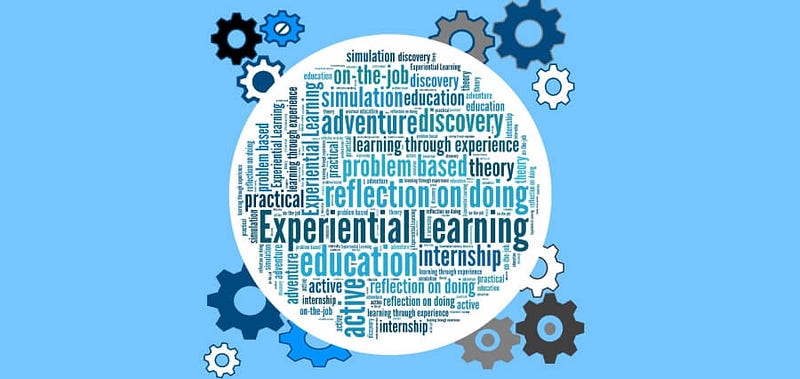
By embracing this dynamic approach to education, individuals are empowered to develop practical skills, critical thinking abilities, and a profound appreciation for the relevance of their learning journey in the ever-changing landscape of the modern era.
What is Experiential Learning?
Experiential learning is an educational approach that emphasizes hands-on experiences as a primary method of learning. It is a departure from traditional classroom-based instruction, where students actively engage in real-world experiences related to the subject matter. By directly immersing themselves in practical activities, students gain a deeper understanding of the topic and develop essential skills that are transferable to various aspects of life.
The Four Stages of Experiential Learning
Experiential learning typically follows a cyclical process consisting of four stages:
- Concrete Experience
In this stage, learners engage in direct experiences that form the foundation of their learning journey. Whether it’s conducting experiments in a science lab, participating in a mock business simulation, or creating artwork, the concrete experience serves as the starting point for knowledge acquisition.
- Reflective Observation
After the concrete experience, learners reflect on their actions and observations. They analyze what they have learned, identify patterns, and make connections between theory and practice. Reflective observation allows for introspection and the integration of new knowledge with existing understanding.
- Abstract Conceptualization
During this stage, learners develop concepts, theories, or models based on their reflections. They extract general principles from their experiences and build a framework for understanding. Abstract conceptualization involves critical thinking and the synthesis of ideas to form a coherent understanding of the subject matter.
- Active Experimentation
In the final stage, learners apply their newly acquired knowledge and test their theories in practical situations. They actively engage in problem-solving, decision-making, and creative exploration. Active experimentation allows learners to refine their understanding and adapt to different scenarios.
Experiential Learning in Different Fields
Experiential learning can be implemented in various fields, amplifying its impact on education. Let’s explore how experiential learning is applied in specific disciplines:
In science education, experiential learning takes center stage. Students conduct experiments, observe phenomena, and engage in hands-on activities to explore scientific concepts. This approach fosters a deeper understanding of scientific principles and cultivates essential skills such as critical thinking, problem-solving, and collaboration.
- Experiential Learning in Art and Design
Art and design education benefit greatly from experiential learning. Students actively create, experiment, and express themselves through various mediums. By engaging in hands-on artistic experiences, learners develop their creativity, refine their technical skills, and gain a profound appreciation for the power of visual communication.
- Experiential Learning in Business and Entrepreneurship
In the realm of business and entrepreneurship, experiential learning plays a crucial role in preparing future leaders. Students participate in simulations, start their ventures, and collaborate on real-world projects. Through these experiences, they develop a deep understanding of business principles, strategic thinking, and effective decision-making.
Implementing Experiential Learning: Best Practices
To effectively implement experiential learning, educators should consider the following best practices:
- Creating Engaging Experiences
Design hands-on activities that captivate learners’ attention and foster active engagement. Incorporate real-world scenarios, role-playing, and interactive technologies to create immersive experiences that connect theory with practice.
- Reflective Practice: The Key to Learning
Encourage students to reflect on their experiences, analyze their actions, and connect them to theoretical concepts. Reflection promotes deeper understanding and helps learners extract valuable lessons from their hands-on encounters.
- Incorporating Technology in Experiential Learning
Utilize technology tools and resources to enhance experiential learning. Virtual simulations, augmented reality, and online collaboration platforms can provide students with immersive and interactive experiences, even in remote or limited-resource settings.
Overcoming Challenges in Experiential Learning
While experiential learning brings numerous benefits, it has its challenges. Common hurdles include limited resources, time constraints, and the need for effective assessment methods. Educators must find creative solutions to overcome these obstacles and ensure seamless integration of experiential learning into the curriculum.
The Future of Experiential Learning
As education continues to evolve, experiential learning is expected to play an increasingly significant role. With advancements in technology, the integration of virtual and augmented reality, and a growing emphasis on hands-on experiences, the future of experiential learning holds immense potential for revolutionizing education and preparing learners for the complexities of the real world.
Experiential learning is a transformative educational approach that empowers learners through hands-on experiences. By immersing themselves in real-world activities, students gain a deeper understanding of concepts, develop crucial skills, and cultivate a lifelong love for learning. As educators embrace the power of experiential learning, they open doors to a more engaging, impactful, and relevant education system.
craedit: https://theeducationview.com/unlocking-the-power-of-hands-on-education-experiential-learning/
























